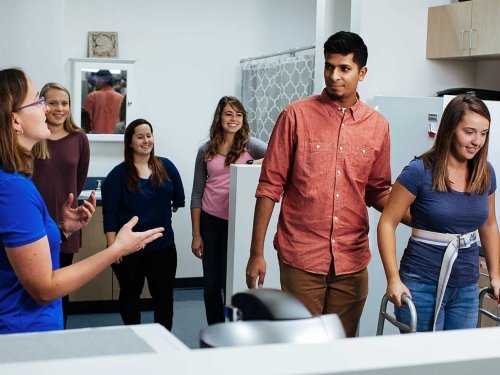Occupational Therapy
In the Occupational Therapy Program, you will learn how to improve the daily lives of your patients through responsive, compassionate, and evidence-based treatments.

IL - Downers Grove
- In-Person
College Doctor, Occupational Therapy (IL)
Duration33 months, full-time
Class Size Approximation50
The Midwestern Advantage
Midwestern University's investment in education, faculty, research, facilities, and clinical training translates into our students being "Day One Ready.”
The Occupational Therapy Program offers a curriculum leading to the Doctor of Occupational Therapy (OTD) degree for qualified students. The full-time, continuous, entry-level doctoral curriculum is designed to deliver the academic and clinical education required to prepare students for their professional role as key members of the healthcare team, and as integral practitioners in the healthcare delivery system.
View program details in our Academic Catalog*
*Subject to change
Midwestern University’s Doctor of Occupational Therapy (O.T.D.) Program provides the foundation for you to contribute to and identify healthcare solutions for patients of various ages, diagnoses, and occupational challenges.
The Occupational Therapy Program is fully accredited by the Accreditation Council for Occupational Therapy Education (ACOTE). The Program offers a curriculum leading to the Doctor of Occupational Therapy (OTD) degree for qualified students. The entry-level OTD curriculum is designed to deliver the academic and clinical education required to prepare students for their professional role as key members of the healthcare team, and as practice leaders in the healthcare delivery system. The curriculum for the Doctor of Occupational Therapy degree is a continuous, full-time program, extending 33 months from matriculation to graduation. The maximum allotted time for completion of this program is 49.5 months. It is also required that all Level II fieldwork and successful completion of a competency requirement be accomplished prior to the commencement of a 14-week, full-time doctoral internship. The general education, professional training, experience, and personal character development of occupational therapists uniquely prepare them to respond to and meet the needs of individuals who face challenges participating in their daily lives.
The Doctor of Occupational Therapy Program offers a balanced combination of foundational, experiential, research, and program development coursework designed to foster practice leaders who will meet the occupational needs of individuals and communities through compassionate, innovative, and evidence-informed practice. The Program will provide students with a thorough complement of coursework. Of the 160 required credits in the curriculum, approximately one-third are earned in foundational OT process and practice courses; one-third are focused on research, professional praxis, leadership and program development courses; and one-third of the credits are concentrated on experiential coursework. The strong curricular framework succeeds in preparing graduates who are able to enter the profession of occupational therapy and make a difference in the world.
The Occupational Therapy Program is open on a competitive admission basis to applicants who have received a baccalaureate degree in any field, but who have not completed an accredited Occupational Therapy program. The Program does not accept students who transfer from another Occupational Therapy program. The curriculum is designed to prepare entry-level practitioners to provide occupational therapy services in the home, community, and clinical practice settings that require independent judgment, leadership, and self-directed practice. The Program provides the foundation for graduates to identify and contribute to effecting solutions to excellence in healthcare for individuals of varied ages, diagnoses, and occupational challenges as well as influencing the academic and clinical education of future practitioners. The graduates of the Program will be practice leaders who are well-suited and prepared to make meaningful, ongoing contributions to society, healthcare, and the profession through leadership and collaborative efforts with others in occupational therapy and interprofessional education, practice and research.
Upon completion of the Doctor of Occupational Therapy Program, graduates are expected to:
- Deliver evidence-informed, occupation-based and occupation-focused services to individuals and groups to promote health, well-being and quality of life.
- Meet the occupational needs of culturally and socially diverse individuals and communities through advocacy and leadership.
- Develop and implement innovative programs for occupational therapy services in traditional and emerging areas of practice.
- Engage in clinical research to facilitate promotion and dissemination of knowledge.
- Uphold the ethical standards, values and attitudes of the occupational therapy profession in one's work, service, and ongoing professional development.
These outcomes are accomplished through:
- A curriculum model based on intentionally sequenced courses that serve as vital links between application, synthesis, and evaluation of knowledge, skills and attitudes.
- Intentional dynamic integration of authentic clinical experiences across the curriculum.
- Critical application of current research and available evidence to improve occupational therapy practice and contribute to the knowledge base of the profession.
- Occupation-focused coursework and fieldwork experiences designed to embrace critical and ethical reasoning across the lifespan.
- Collaboration to facilitate individual and group work to develop leadership, team building, and professional skills, behaviors and attitudes.
The professional doctorate curriculum is composed of 45 required course credits (quarter hours) for the first calendar year, 60 required course credits for the second calendar year, and 55 required course credits for the third calendar year, for a total of 160 quarter credits. All courses in each quarter are prerequisite to courses in the subsequent quarter.
Fieldwork courses are placed in the second and third years of the curriculum and include two Level I experiences and two 12-credit Level II Fieldwork experiences. Students' proficiency in evaluation and intervention, independent decision-making and critical thinking are emphasized during Fieldwork II-A and II-B of the curriculum. Fieldwork experiences are offered in clinical, community, hospital, school, and other facilities that have a legal agreement with the University and are located throughout the continental United States.
As one component of the Capstone process, the 14-week Doctoral Internship is positioned in the winter and spring quarters of the third year of the curriculum. Whereas the Fieldwork Level II experiences primarily focus on evaluation and intervention processes of occupational therapy, the Capstone and Doctoral Internship experiences are individualized according to each student's areas of interest in occupational therapy program development, research, leadership, education, or advocacy.
The Midwestern University College of Health Sciences Occupational Therapy Program reserves the right to alter its curriculum however and whenever it deems appropriate.
The Occupational Therapy Program is accredited by the Accreditation Council for Occupational Therapy Education (ACOTE) of the American Occupational Therapy Association (AOTA), located at 7501 Wisconsin Avenue, Suite 510E Bethesda, MD 20814. ACOTE's telephone number c/o AOTA is 301-652-6611, and its web address is www.acoteonline.org.
Midwestern University is accredited by The Higher Learning Commission 230 South LaSalle Street, Suite 7-500, Chicago, IL 60604-1411.
View program results from the National Board for Certification in Occupational Therapy (NBCOT): https://www.nbcot.org/EDUCATORS-FOLDER/SCHOOLPERFORMANCE.
Learn More
Explore comprehensive details about the Doctoral Occupational Therapy Program (subject to change).
Career Placement & Salaries
Campus Options


Downers Grove
Located just 25 miles west of Chicago. Students can study and live in the comfort and safety of a 105-acre campus in the suburbs and can practice at our University-owned clinics located just 10 minutes away.

